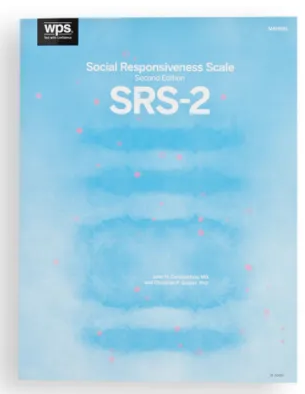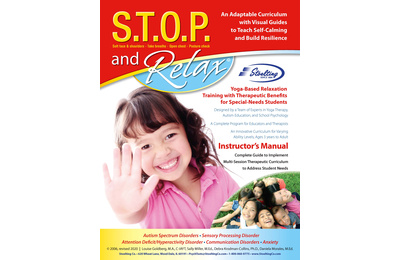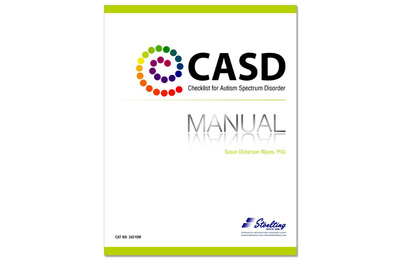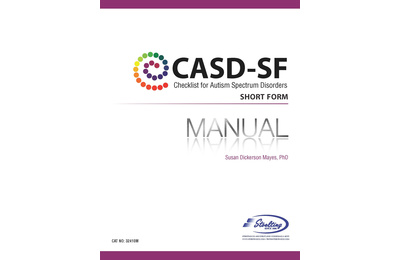Please specify the quantity of product(s).



Social Responsiveness Scale, Second Edition (SRS-2)
| Item | Product | Price | QTY |
|---|---|---|---|
| 32990 | Social Responsiveness Scale-2nd Ed.(SRS-2) Hand-Scored Kit | $539.00 | |
| 32990P | SRS-2 Preschool AutoScore Forms, Pk/25 | $102.00 | |
| 32990-AS | SRS-2 School-Age AutoScore Forms, Pk/25 | $102.00 | |
| 32990-AA | SRS-2 Adult AutoScore Forms, Pk/25 | $102.00 | |
| 32990-AR | SRS-2 Adult Self-Report AutoScore Forms, Pk/25 | $102.00 | |
| 32990M | SRS-2 Manual | $159.00 |
The Social Responsiveness Scale (SRS-2) identifies impairment associated with Autism Spectrum Disorders.. Quantifies severity, detects subtle symptoms, and differentiates clinical groups, within the Autism Spectrum, and between ASD and other disorders.
Offers the convenience of a screener and the power of a diagnostic tool.
- Age Range: Preschool–2.5-4.5 years; School-Age–4 through 18 years; Adult–19 years and up
- Time: 15-20 minutes
The SRS-2 identifies social impairment associated with Autism Spectrum Disorders (ASD) and quantifies the severity. It detects subtle symptoms and differentiates clinical groups, both within the Autism Spectrum, and between ASD and other disorders.
While many Autism assessments focus on severe abnormalities observed in the laboratory or office, the SRS-2 looks at subtle reciprocal social behavior as it occurs in natural, everyday settings. Impairment in reciprocal social behavior is the defining characteristic of Autism. The SRS-2 scores of individuals with Autism are consistently higher than those of individuals with other clinical disorders.
The SRS-2 offers four forms, each with 65 items, and each for a specific age group:
- School-Age Form: for ages 4 through 18, completed by parent or teacher (composed of the same items that appeared on the original SRS)
- Preschool Form: for ages 2½ to 4½, completed by parent or teacher
- Adult Form: for ages 19 and up, completed by relative or friend
- Adult Self-Report: Form for ages 19 and up
Using these multiple perspectives on behavior, observed in natural settings, and rated on a graduated-response scale, uncovers a wide range of symptoms, including those that are relatively subtle. Numerous independent studies demonstrate the SRS-2 is unmatched in its ability to measure severity of social impairment in the mildest, most common, forms of ASD–including Social Communication Disorder–a new diagnosis proposed for the DSM-5.
In addition to a Total Score, reflecting the severity of social deficits in the Autism Spectrum, the SRS-2 generates scores for five Treatment Subscales:
- Social Awareness
- Social Cognition
- Social Communication
- Social Motivation
- Restricted Interests and Repetitive Behavior
The SRS-2 also offers two, new DSM-5 Compatible Subscales:
- Social Communication and Interaction
- Restricted Interests and Repetitive Behavior
Scores on these subscales allow easy comparison of client symptoms to DSM-5 diagnostic criteria for ASD. Such comparisons clearly inform diagnosis, and help determine whether the individual meets the most current diagnostic criteria.
The SRS-2 is supported by a multitude of independent, peer-reviewed studies, conducted in schools and clinics throughout the world, involving diverse populations and diagnostic groups. These studies show that the SRS-2 discriminates both within the Autism Spectrum and between ASD and other disorders, making it highly useful for differential diagnosis. When the SRS-2 reveals social deficits associated with Autism, it tells exactly where these symptoms fall on the spectrum. When the test indicates Autism is not present, it often points to other conditions in which social impairment plays a role.
Useful in Educational, Clinical and Research Settings
The brevity and sensitivity of the SRS-2 make it useful for a variety of assessment needs. Its quantitative nature and wide age range make it ideal for measuring response to intervention over time. Furthermore, its reliance on day-to-day observations of parents and teachers makes it easy to use in clinical research and educational settings.
It is crucial, in all of these settings, to isolate ASD from other psychiatric conditions, and the SRS-2 is well-suited to this purpose. It clearly distinguishes the social impairment characteristic of ASD from that seen in ADHD, anxiety, and other diagnoses.
The SRS-2 Hand-Scored Kit includes 25 Preschool AutoScore Forms; 25 School-Age AutoScore Forms; 25 Adult (Relative/Other Report) AutoScore Forms; 25 Adult (Self-Report) AutoScore Forms; Manual. Kit for ages 2.5 to adult.


